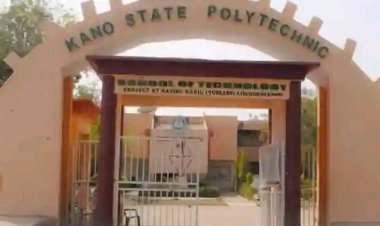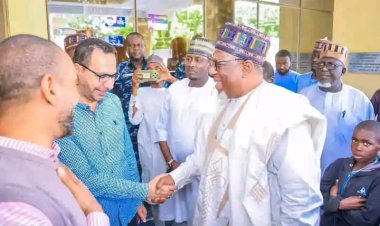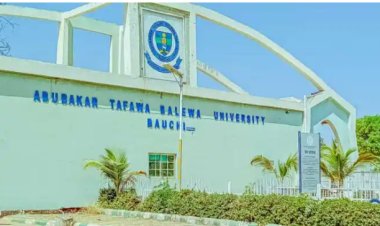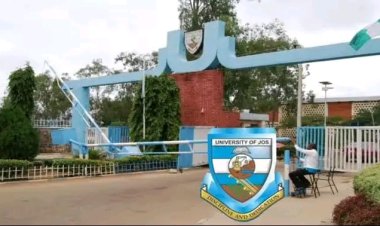Nigerian Students Doctors Share Their Experiences in Top USA Teaching Hospital
It was evident that a new chapter in the clinical training of medical students had begun upon the signing of the tripartite partnership agreement on January 10, 2023 between Afe Babalola University, Ado-Ekiti (ABUAD), Little-by-Little Foundation, and Johns Hopkins Hospital, USA.
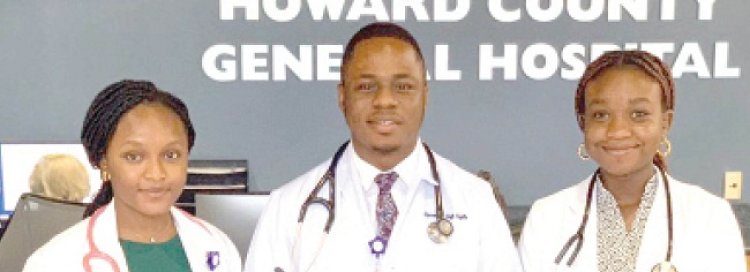
It was evident that a new chapter in the clinical training of medical students had begun upon the signing of the tripartite partnership agreement on January 10, 2023 between Afe Babalola University, Ado-Ekiti (ABUAD), Little-by-Little Foundation, and Johns Hopkins Hospital, USA.
The ceremony took place on the serene campus of the 13-year-old university in the heart of Ado-Ekiti, South-West, Nigeria. The optional clinical training, the first of its kind in this climate, will expose recipients to top-notch training in one of the premier teaching hospitals in the world, John Hopkins Hospital, USA.The trio of Boluwatife Akinoso, Odafe Angela Okparanyote, and Moyinoluwa Omoyajowo, all 600 Level MBBS ABUAD students, traveled to the US on April 14, 2023, for a clinical posting under the tripartite agreement, ninety-four days after the agreement was signed.
The following are the first-ever clinical posting recipients’ accounts of their interactions with Johns Hopkins Hospital staff and facilities: Okparanyote, Odafe Angello a final year ABUAD medical student has this to say:
“My colleagues and I were well received at the airport by the Little-by-Little Foundation and we were helped to settle in comfortably in our extended stay apartment. “The rotation experience has been stunning and educative. I began my rotation in Endocrinology for my first week and the level of attention to details, the synchrony amongst everyone in the system and the quality of treatment given has been incredible. The environment is welcoming and friendly.
Supervisors/Consultants are willing and ready to give as much knowledge as they can. The various patients I’ve personally interacted with have been quite kind and open, willing to give information when asked and comfortable to be examined. “The care given is universal, but treatment is based on insurance coverage and on some occasions, patients may have to pay out of pocket if they aren’t covered by insurance. One of the healthcare devices that attracted my interest was the Continuous Glucose Monitor (CGM), which enables diabetics to check their blood glucose at any time without having to have multiple needle pricks. It is a tiny sensor inserted under the skin on the arm. It can be used to monitor blood glucose levels throughout the day, reveal hidden glucose patterns and show how activities affect blood glucose.
“My first week was really exciting and insightful and I am hoping the following weeks in the other rotations will be of further great impact.” On her part, MoyinOluwa Omoyajowo relates her experiences between thus: “We arrived in Baltimore on April 14, 2023 for the programme and were warmly received at the airport by the representatives of Little-by-Little Foundation who thereafter took us to the hotel to settle into our accommodation. They also provided us with foods and drinks.
“I observed that during the post morbidity case review, the team used the session to improve team’s performance and patients’ case management rather than a fault-finding exercise whenever a mistake was discovered in the management of a patient. They take any identified gap as a team’s responsibility for resolution.“Any criticism is constructive rather than destructive. Also, whatever mistakes that were admitted during the session cannot be used against the individual in the court of law. This is done to enable doctors to always speak the truth about any mistakes made and seek to do better next time they are managing a patient with a similar case. “The hospital has a physicians’ lounge where free food is provided and where physicians can interact. The lounge has computers for use of the physicians. “I observed that during the post morbidity case review, the team used the session to improve team’s performance and patients’ case management rather than a fault-finding exercise whenever a mistake was discovered in the management of a patient. They take any identified gap as a team’s responsibility for resolution. “Any criticism is constructive rather than destructive. Also, whatever mistakes that were admitted during the session cannot be used against the individual in the court of law. This is done to enable doctors to always speak the truth about any mistakes made and seek to do better next time they are managing a patient with a similar case. “The hospital has a physicians’ lounge where free food is provided and where physicians can interact.
The lounge has computers for use of the physicians. “I am also super grateful to the Little-by-Little Foundation for giving us a “once in a lifetime” opportunity to undertake this programme which medical students in other countries may not have access to. With this, we also have epic certification. I thank Little-by-Little Foundation for its constant hospitality and for always checking up on us and making sure that we get the best from the clinical elective posting. Their support is highly commendable and appreciated. “Lastly, I commend our founder and chancellor, Aare Afe Babalola, for establishing the world-class 400-bed ABUAD Multisystem Hospital because some of the equipment that I saw at the hospital of my clinical elective posting are also available at ABUAD Multisystem Hospital and I’m happy that I was given the opportunity to see them and how they function. In all, it has been a wonderful experience so far and I can’t wait to see what the other weeks have to offer. We are so grateful to ABUAD for giving us this opportunity and we do not take it for granted.” Boluwatife Akinoso states her experiences as follows: “My name is Boluwatife Akinoso. I’m a 600 level medical student of Afe Babalola University. I am currently undertaking my electives in my first assigned unit in Internal Medicine – Pulmonology at Johns Hopkins Medicine.
So far, it has been very delightful. “First, I would love to commend our founder and chancellor, Aare Afe Babalola for a job well done with regards to ABUAD’s Multi-System Hospital. Compared to what we are seeing here, the difference was quite minimal in terms of the diagnostic machines, the structure, medical equipment, electronic medical records and the 24-hour electricity supply.
“One thing I have noticed so far at Johns Hopkins Medicine is the division of labour. Here, the patients have primary healthcare doctors before they are presented to the hospital. The Pulmonology Department, where I am assigned consists of about three doctors and each person has a different role to play in caring for the patients. For instance, if a patient with pleural effusion needs thoracocentesis or catheter placement, the doctor places an order for it and it will be done by the interventional radiologist. “Once a patient is present at the hospital, blood is already taken as fast as possible and most of the laboratory results are ready in a few minutes and uploaded on the patient’s electronic medical record. History taking is more concise here because most of the information is already in the electronic medical records and investigations such as computed Tomography Angiogram (to rule out pulmonary embolism), X-ray, CT-Scan, echocardiography and electrocardiography are done swiftly if they are needed. Unlike in Nigeria where patients must pay, which further delays investigations; definitive diagnosis and even treatment, most of the investigations here are covered by insurance. This greatly speeds up the process and makes room for efficient patient care.
“There are medical equipment that I got to see and learn about recently. A good example is the Continuous Glucose Monitoring (CGM) device and the Sequential Compressive device. The PET scan is utilised in the diagnosis of cancer to determine if it truly exists, and/or if there is metastasis. “It has the added advantage of whole-body scan, therefore limiting multiple CT scans and reduces patient exposures to radiation. “However, it is very expensive and not readily available, especially in low resource countries. The Sequential Compressive device is a compression sleeve that is worn on the legs; they work by inflating and deflating. Their actions mimic walking, and this helps prevent blood clots in patients at risk of DVT during hospitalisation.
“An interesting thing I have noticed with the patients here is that they are well educated about their illnesses. By this I mean that they have a good idea of the illness, the drugs they are taking and the probable side effects of some of the drugs. They even go as far as challenging the doctors and ask them a lot of questions. It is therefore very important that accurate diagnosis is made and medical is advice given. “I also have to talk about how nice most people here are. The doctors are very nice. They deliberately go out of their ways to make ensure that I am comfortable. The health workers are equally splendid and accommodating. The doctors also take their time to explain further when you do not really understand some things. The other day, the consultant I worked with got me food. Most people here are just genuinely nice and this creates an atmosphere for me to ask more questions and learn more about the patient’s condition. “My immense appreciation goes to Little-by-Little Foundation for this fantastic opportunity. I will like to say a big thank you to the amazing Dr Tokunbo Ajayi, and the other members of the Little-by-Little Foundation for making this possible. “I am so grateful for their support, tutoring and for taking us on sightseeing and shopping. We really appreciate everything and it will not be taken for granted. I can’t wait to see what the remaining three weeks hold. I am sure that I am having great time learning, and having a great exposure about different ways of organising a community which I hope will be of great benefit to me, my colleagues and Nigeria as a whole.” The conclusion was made by Tokunbo Ajayi, M.D., an assistant professor at the Department of Internal Medicine, Collaborative Inpatient Medicine Service (CIMS), Johns Hopkins Medicine, Howard County General Hospital: “It has been epic, eventful and full of learning experiences that will shape them for life. They have impressed their teachers and Johns Hopkins has been an excellent learning environment so far.”

 Akeelah
Akeelah 